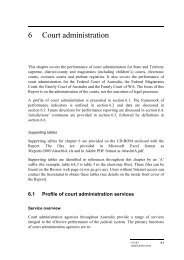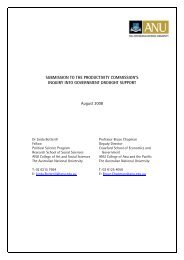Dr Vanda Rounsefell - Productivity Commission
Dr Vanda Rounsefell - Productivity Commission
Dr Vanda Rounsefell - Productivity Commission
You also want an ePaper? Increase the reach of your titles
YUMPU automatically turns print PDFs into web optimized ePapers that Google loves.
Again, there is no easily defined duty of care or legal responsibility context. One bottom-up<br />
organisation has been shown legally not to be responsible for the actions of self-help members.<br />
The criminal law does apply individually however. But no duty of care can be levelled at managers<br />
of a distant office or board which pays for a national scale insurance policy, when the whole<br />
organisation is run by local collective decision and action within the context of informal groups.<br />
This may create problems when special access eg to prisons, schools or hospitals is required.<br />
Volunteers must be certified on their own reconnaissance and can never be endorsed by an<br />
orgnaisation that has no knowledge of the person nor ability to vet people. Issues of this type are<br />
not discussed in your document, but are increasingly relevant in today’s litigious society. One office<br />
manager was recently threatened with a gaol term if the organisation ‘allowed’ a certain paedophile<br />
to enter a school, he having claimed to have been sent by the organisation, which was not the<br />
case.<br />
2.2: NPOs are more likely to take a principled approach to processes and decision making, rather<br />
than a contract or tightly specified understandng, including in decision making. I would suggest you<br />
investigate (for the purpose of offering training to NPOs) the model called ‘Sociocracy’ as an<br />
excellent approach that combines inclusiveness, decision making, voting processes etc with quality<br />
control (its origins included ISO9000 connectivity). See ‘We the People: Consenting to a Deeper<br />
Democracy: A Guide to Sociocratic Principles and Methods by Buck & Villines<br />
(SOCIOCRACY.INFO, Washington DC, 2007 (the only book on this subject in English). Used by<br />
EcoVillages and businesses in the USA, New Zealand, Australia and Europe.<br />
2.3: Suggest add ‘self help’ to your diagram. Self help is a key difference in NPOs cf the<br />
‘government magic pudding’ approach. Aboriginal dependency is a good example of how this<br />
goodwill backfires. AA’s 7 th Tradition (‘self supporting by our own contribution’), is part of the<br />
underpinning or personal recovery and funding can undermine this.<br />
Short termness of funding undermines things that are needed ongoing in society. I have seen over<br />
and over, huge embodied personal energy invested in successful short term funded projects, only<br />
to see the doors close again when the money runs out. This suggests there should be a<br />
component of assistance in development of self-sufficiency along with the grant-for-purpose.<br />
2.9: As above. Government agencies and even ministers, often assume that bottom-up<br />
organisations will be capable of a command-and-control based co-operative relationship across a<br />
region, a State or the nation. There can be a modular, eMyth type approach, but there is still a<br />
need to tailor each enterprise locally to those conditions. It is therefore almost impossible to<br />
contract with a bottom-up organisation, and the best that can be hoped for is a policy of cooperation.<br />
2.13: I have been associated with an NPO that had some attractive intellectual property. The<br />
model was appropriated by two separate State Government departments, which took the model<br />
and adapted it for hundreds of people’s consumption, thus undermining the anticipated training<br />
work the NPO had been relying on for viability. The NPO has since, for this and other and<br />
structural reasons, closed. Another reason was inexperience with setting up a viable structure and<br />
unrealistic expectations of itself during the start-up phase.<br />
This phase is the most vulnerable, and many worthy ideas disappear when a structure is<br />
unsatisfactory for purpose. A business incubator model with mentoring would be well applied to<br />
NPOs. At the same time, consultants often skim off thousands, leaving a new NPO none the wiser<br />
and brittle through inadequate funding. There is a huge education and training need here that<br />
could avoid significant HR and $ waste. A DIY approach with coaching provided or a simple, free<br />
setup framework that could then go to a consultant for checking, would be helpful.<br />
2.18: Re efficiency. With AA, the point of service volunteer work is to structure time in a way that is<br />
interesting and meaningful, filling the time formerly spent drinking, at the same time as reaching<br />
out to other alcoholics. Thus, business efficiency for the Board is perhaps relevant, but not for the<br />
whole organisation. Even the Board is 2/3 made up of members doing service, and all for a fixed<br />
term. There therefore needs to be a careful distinction between different types of efficiency<br />
demanded from different parts or functions of an organisaion. When there is an (often obligatory)<br />
rotation of officeholders, the issue of institutional memory is relevant. Therefore another metric one<br />
could look at is not so much the money as what systems and media are in place that clarify the<br />
4

















